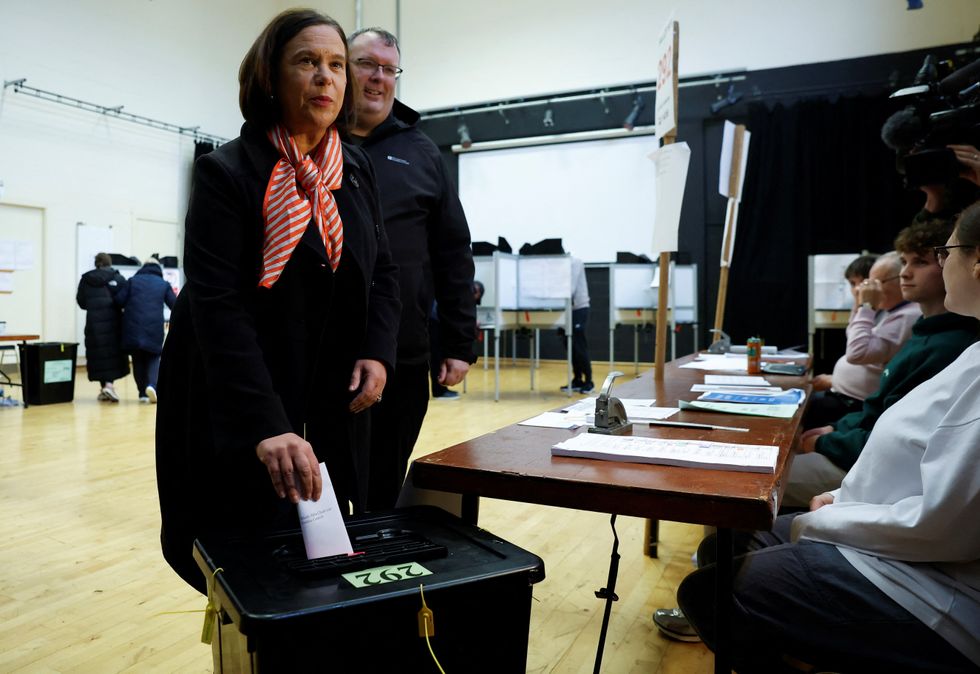George Bunn
Guest Reporter
Ireland's main opposition party is on course to narrowly win the most votes at the General Election, but its two main centre-right rivals will likely have enough seats to govern again without the party.
The exit poll puts Sinn Féin on 21.1 per cent, the centre-right Fine Gael with Prime Minister Simon Harris on 21 per cent and like-minded coalition partner Fianna Fáil on 19.5 per cent.
Opinion polls had suggested the three main parties were neck-and-neck ahead of the vote and that Ireland was heading for a broadly similar result to the last election in 2020.
Fine Gael and Fianna Fáil pledged ahead of the election to seek to form a coalition without Sinn Féin, just as they did after the 2020 general election when Sinn Fein also narrowly won the popular vote.




Fine Gael and Fianna Fáil will likely need the support of at least one other smaller party to reach a majority. They currently govern alongside the Greens.
Results also indicate that the Green Party first preference support stands at four per cent; Labour at five per cent; the Social Democrats at 5.8 per cent; People Before Profit-Solidarity at 3.1 per cent; and Independents at 12.7 per cent, Independent Ireland 2.2 per cent with others on 1.9 per cent.
Taoiseach Harris called the election on the heels of a 10.5 billion euro giveaway budget that began to put money into voters' pockets during the campaign, made possible by billions of euros of foreign multinational corporate tax revenues.
However, a campaign full of missteps for his Fine Gael party, culminating last weekend in a viral clip of Harris walking away from an exasperated care worker, cost them their pre-election lead.
LATEST DEVELOPMENTS

The number of seats required for an overall majority is 88 but no single party is fielding enough candidates to win a majority on its own.
The first meeting of the new Dáil (lower house of parliament) is on December 18 but it is unlikely coalition negotiations will have finished by then.
Find Out More...
The exit poll puts Sinn Féin on 21.1 per cent, the centre-right Fine Gael with Prime Minister Simon Harris on 21 per cent and like-minded coalition partner Fianna Fáil on 19.5 per cent.
Opinion polls had suggested the three main parties were neck-and-neck ahead of the vote and that Ireland was heading for a broadly similar result to the last election in 2020.
Fine Gael and Fianna Fáil pledged ahead of the election to seek to form a coalition without Sinn Féin, just as they did after the 2020 general election when Sinn Fein also narrowly won the popular vote.




Fine Gael and Fianna Fáil will likely need the support of at least one other smaller party to reach a majority. They currently govern alongside the Greens.
Results also indicate that the Green Party first preference support stands at four per cent; Labour at five per cent; the Social Democrats at 5.8 per cent; People Before Profit-Solidarity at 3.1 per cent; and Independents at 12.7 per cent, Independent Ireland 2.2 per cent with others on 1.9 per cent.
Taoiseach Harris called the election on the heels of a 10.5 billion euro giveaway budget that began to put money into voters' pockets during the campaign, made possible by billions of euros of foreign multinational corporate tax revenues.
However, a campaign full of missteps for his Fine Gael party, culminating last weekend in a viral clip of Harris walking away from an exasperated care worker, cost them their pre-election lead.
LATEST DEVELOPMENTS
- Student dies on first date from allergic reaction after restaurant changed mahi mahi fish recipe
- London pub rebrands as 'The Extinction Arms' with makeover to highlight future for boozers
- MI6 chief warns abandoning Ukraine would lead to ‘infinitely higher’ long-term security costs

The number of seats required for an overall majority is 88 but no single party is fielding enough candidates to win a majority on its own.
The first meeting of the new Dáil (lower house of parliament) is on December 18 but it is unlikely coalition negotiations will have finished by then.
Find Out More...